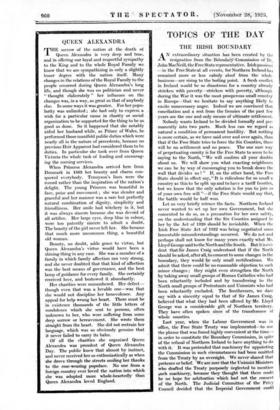QUEEN ALEXANDRA.
IIIIE sorrow of the nation at the death of Queen Alexandra is very deep and true, and in offering our loyal and respectful sympathy to the King and to the whole Royal Family we know that we are sympathizing in only a slightly lesser degree with the nation itself. Many changes in the relations of the Royal Family to the people occurred during Queen Alexandra's long life, and though she was no politician and never " thought elaborately " her influence on the changes was, in a way, as great as that of anybody else. In some ways it was greater.. For her popu- larity was unlimited ; she had only to express a wish for a particular cause in charity or social organization to be supported for the thing to be as good as done. So it happened that she notably aided her husband while, as Prince of Wales, he performed those manifold public duties which were nearly all in the nature of precedents, because no previous Heir Apparent had considered them to be duties. In particular she took over from Queen Victoria the whole task of leading and encourag- ing the nursing services.
When Princess Alexandra arrived here from Denmark in 1863 her beauty and charm con- quered everybody. Tennyson's lines were the record rather than the inspiration of the nation's delight. The young Princess was beautiful in face, poise and movement ; she was slender and graceful and her manner was a rare but perfectly natural combination of dignity, simplicity and friendliness. Her smile had witchery in it, but it was always sincere because she was devoid of all artifice. Her large eyes, deep blue in colour, were too patently sincere to admit a doubt. The beauty of the girl never left her. She became that much more uncommon thing, a beautiful old woman.
Beauty, no doubt, adds grace to virtue, but Queen Alexandra's virtue would have been a shining thing in any case. She was a member of a family in- which family affection ran very strong, and she never doubted that that kind of affection was the best means of governance, and the best lamp of guidance for every family. She certainly received love, and bestowed it abundantly.
Her charities were unnumbered. Her defect— though even that was a lovable one—was that she would not discipline her benevolence. Any appeal for help wrung her heart. There must be in existence thousands of the little letters of condolence which she sent to persons, often unknown to her, who were suffering from some deep sorrow or bereavement. She wrote them straight from the heart. She did not restrain her language, which was so obviously genuine that it never failed to carry its balm.
Of all the charities she organized Queen Alexandra was proudest of Queen Alexandra Day. The public knew that almost by instinct, and never received her so enthusiastically as when she drove through the streets smiling her thanks to the rose-wearing populace. No one from a foreign country ever loved the nation into which she was adopted more whole-heartedly than Queen Alexandra loved England.






















































 Previous page
Previous page